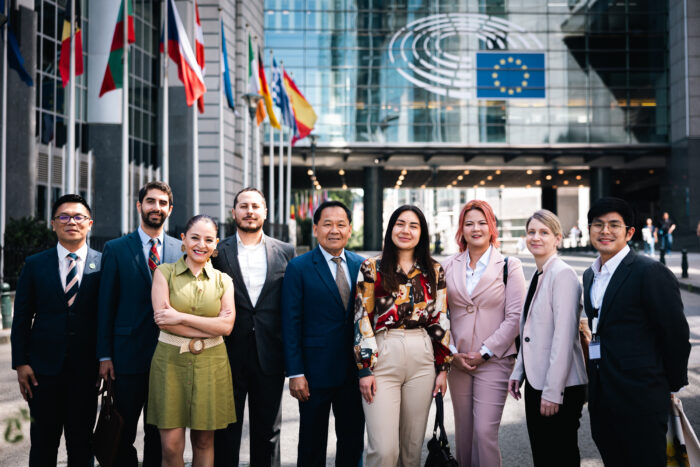
Asia, Latin America and Europe are all facing the global menace of disinformation perpetuated by authoritarian countries, so it is about time for defenders of democracy and freedom from these three regions to learn from each other and fight back. On 11-16 May 2025, delegations from the Council of Asian Liberals and Democrats (CALD) and the Red Liberal de America Latina (RELIAL) travelled to Brussels, Belgium to share experiences with their European counterparts on countering disinformation, particularly those coming from China and Russia. More specifically, the CALD and RELIAL joint delegation wanted to know what strategies and tools proved effective in addressing state-sponsored disinformation in Europe, and to what extent they can be replicated in their respective regions. “There appears to be increasing convergence and collaboration between the disinformation operations of China and Russia, both within the Asian region and on a global scale”, observed CALD Chairperson Mardi Seng. “They align their (false) narratives on global issues, they mutually amplify those narratives in their state media outlets, and they learn and adopt each other’s disinformation tactics.” He warned that this convergence between China and Russia’s disinformation campaigns has far-ranging implications for electoral processes, social cohesion, regional security and the democratic way of life. Given the severity of the disinformation problem, delegates from CALD and RELIAL engaged in lively discussions on the European Union’s strategy to combat Foreign Information Manipulation and Interference (FIMI), as well as on sharp power and safeguarding media freedom amidst disinformation campaigns. With representatives from the Europe Office of the Friedrich Naumann Foundation (FNF) and European Liberal Forum (ELF), they tackled liberal approaches to combat disinformation, and learned about legislative tools to counter foreign interference from the Renew Europe Group in the European Parliament. They also discussed the role of the youth and civil society in combating disinformation with European Liberal Youth (LYMEC) and Defend Democracy, respectively. The importance of political strategies and coordination in addressing disinformation was tackled with the Alliance of Liberals and Democrats for Europe (ALDE) Party, apart from discussions on the need for strategic communications and global partnerships in anti-disinformation campaigns. Reflecting on his experience on the dialogue program, CALD Youth Chairperson Jeremiah Tomas said: “One striking realization from the dialogue was how disinformation today operates in subtle, sophisticated ways shaping perceptions and creating fertile ground for political actors to exploit. While much of the European conversation understandably focuses on Russian tactics, it was crucial for us to highlight the Asian experience, where disinformation can be more sublime and, in some ways, more advanced,” he added. “In our region, platforms with built-in censorship features often obscure the issue, making it even more urgent to raise awareness. The youth and civil society must lead the charge in equipping communities with the tools and critical thinking needed to discern misinformation. This cross-regional exchange reminded us that disinformation is a global challenge and only through solidarity, shared learning, and coordinated action can we truly defend democracy.” Apart from Seng and Tomas, the other members of the CALD delegation include: Michael Chen, acting director of the International Affairs Department of Democratic Progressive Party of Taiwan and Poyu Tseng, co-founder of Doublethink Lab, a Taiwan-based organization that does research on malign Chinese influence operations and disinformation campaigns. The dialogue program was spearheaded by RELIAL Coordinator Silvia Mercado with the assistance of FNF Southeast and East Asia Regional Programme Coordinator Thekla Ebbert. Looking at the outcome of the dialogue, Mercado observed: “CALD and RELIAL have highlighted that China’s disinformation efforts are not isolated incidents but part of a well-coordinated, transnational narrative strategy. These campaigns pursue clear geopolitical objectives: to undermine trust in liberal democratic models, position China as a credible alternative to the Western-led order, and reduce the influence of key actors such as the European Union and the United States in strategic regions like Latin America and Southeast Asia.” “A coordinated authoritarian narrative requires a coordinated democratic response, “The next step would be to strengthen alliances among key democratic actors—independent media, political parties, and civil society organizations—by fostering collaboration, sharing timely information and alerts, and showing mutual solidarity. This collective effort is essential to build informational resilience and protect civic space across regions.” |
Categorised in: News Article
This post was written by CALD
 Unit 409, 4/F La Fuerza Plaza 2, 2241 Don Chino Roces Ave. corner Sabio St., 1231 Makati City, Philippines
Unit 409, 4/F La Fuerza Plaza 2, 2241 Don Chino Roces Ave. corner Sabio St., 1231 Makati City, Philippines
 +632 8819 60 71
+632 8819 60 71
 info@cald.org
info@cald.org